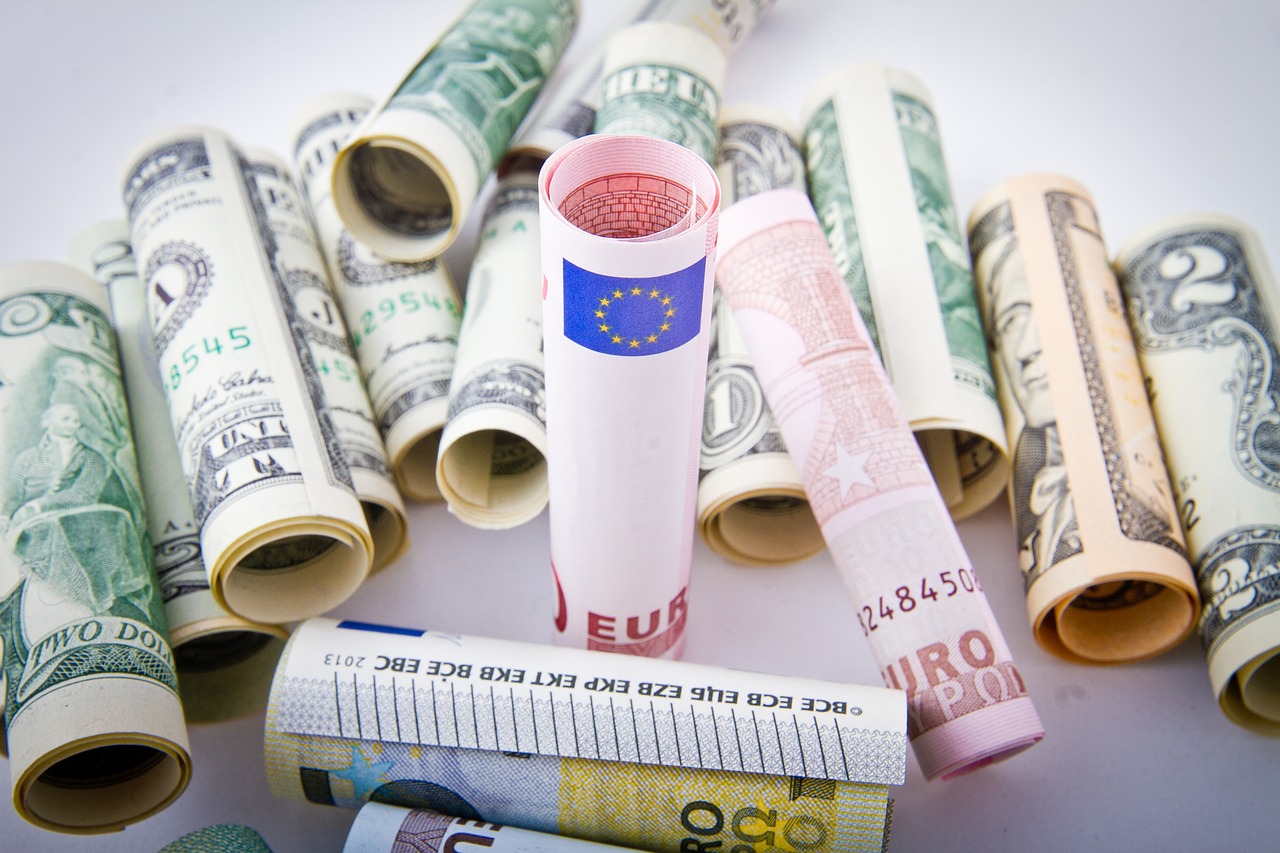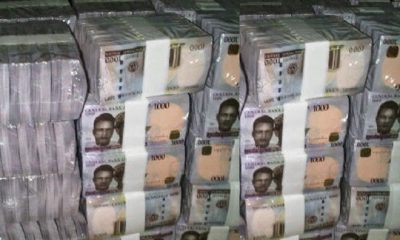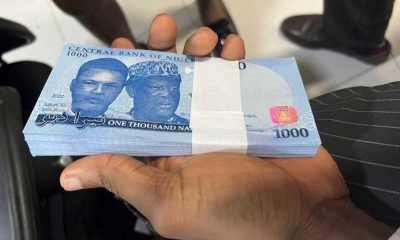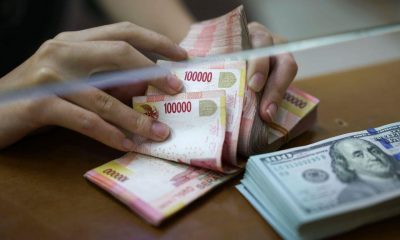Economy
Is Forex in Nigeria Halal or Haram? Case Study

The Muslim population in Nigeria is still expanding. According to estimates, 80–85 million Nigerians (approximately 50% of the population) identify as Muslims, many of whom are probably Sunnis (60 million). Any Nigerian citizen, regardless of religion, can trade forex using Nigerian brokers as long as they are using their own money. However, every individual has to follow their own religious laws to ensure they are trading within the guidelines.
In this article, we are going to try and answer the question, is forex in Nigeria Halal or Haram? Let’s jump right into it.
Forex Trading According to Islam
The mere exchange of currencies is legal as long as traders follow certain guidelines. Additionally, it is legal for Muslim traders to turn a profit when exchanging money. However, the forex market involves more than just exchanging currencies. It also entails making and carrying out various contracts when employing futures, options, interest trading, and other activities. Some people think that the fundamentals of forex trading are consistent with Islamic teachings, while others think they are in opposition to them.
Experts and academics disagree on whether trading in the forex market is halal (permissible) or haram (forbidden) in Islam. Islamic financial rules place a strong emphasis on avoiding interest (riba) and conducting morally and fairly. Under Islamic law, whether trading in foreign exchange is permitted in Nigeria or anywhere else depends on a number of variables, including the particular trading procedures and objectives. Let’s discuss some of the guidelines that determine how Muslim traders should conduct themselves in the market.
Regarding Interest (Riba)
Interest-based transactions are absolutely forbidden in Islamic finance. In traditional Forex trading, overnight-held positions (swap or rollover fees) may be subject to interest charges or earnings. This feature of forex trading can be in violation of Islamic teachings. Also, leveraged trading accounts constantly use an interest component which can render transactions Haram. But investors can utilize Islamic accounts that do not charge overnight fees. These accounts are tailor-made for Muslim traders to ensure they do not break religious laws when transacting.
Speculation and Gambling
Excessive speculation and actions that resemble gambling are discouraged in Islamic finance. Forex trading becomes unlawful if thought to include excessive speculation or is similar to gambling. To maximize the chances of profiting, investors employ a range of tactics to forecast market movement. They observe how the value of various currencies fluctuates without really owning, purchasing, or trading the currency they are speculating on. This raises concerns about whether trading in the foreign exchange market is legal or not.
In reality, the majority of traders are gambling rather than trading. You are gambling if you place trades before determining whether your approach or strategy is lucrative or if you risk real money before determining whether you are a consistently profitable trader. A trader is not gambling because they are aware that, despite occasional setbacks, they will ultimately turn a profit. As long as Muslim traders do not gamble in the process of trading, their activities are within religious guidelines.
Ethical Business Conduct
Islamic finance promotes transactions that are both financially beneficial and have a positive social impact, stressing honest and ethical business practices. If a trader engaged in dishonest or unethical tactics when trading, then they are in violation of Islamic principles. Making money through trading is acceptable in Islam as long as it is done in conformity with Islamic law. Interest charging, referred to as usury, or riba, is exploitative and unfair according to Islamic laws. Muslim traders must conduct themselves ethically, otherwise, their activities would be considered Haram.
What is an Islamic account?
These days, a lot of brokers provide accounts for Islamic forex traders. An Islamic account is a swap-free account that doesn’t charge Muslim traders any overnight fees or swaps. Additionally, they guarantee that financial transactions are completed as quickly as possible. These accounts are made for Muslim investors who want to trade currencies without breaking Islamic laws against interest and excessive uncertainty. An Islamic account also permits keeping positions open for an unlimited period of time, which is consistent with the Islamic concept of avoiding unnecessary uncertainty.
Closing Remarks
Given the factors discussed, some academics and professionals in the Islamic financial sector think that certain types of Forex trading can be regarded as halal if they follow Islamic norms. For instance, some contend that spot Forex trading that doesn’t involve overnight positions (swaps) may be more consistent with Islamic values. For the most part, it seems that forex trading is Halal as long as a Muslim trader uses an Islamic account.
It’s crucial to remember that there isn’t a single, widely accepted position on this matter, and interpretations can differ. Individuals interested in Forex trading in Nigeria should consult certified Islamic scholars or financial specialists who are knowledgeable about both Forex trading practices and Islamic finance principles in order to make an informed conclusion. They can offer advice based on your unique circumstances and trading methods to establish whether a given Forex trading strategy is permitted or prohibited by Islamic law.
Economy
Nigeria’s Economy Expands 4.07% in Q4 2025

By Adedapo Adesanya
Nigeria’s economy, measured by gross domestic product (GDP), grew by 4.07 per cent (year-on-year) in real terms in the fourth quarter (Q4) of 2025.
The National Bureau of Statistics (NBS) announced the development in its latest GDP report for Q4 2025 on Friday.
The latest figure represents an improvement over the 3.76 per cent growth recorded in the corresponding period of 2024, signalling sustained recovery across key sectors of the economy. The growth rate was faster than the third quarter’s 3.98 per cent.
The report confirmed that Nigeria’s oil sector grew 6.79 per cent year-on-year and the non-oil part of the economy expanded by 3.99 per cent.
Nigeria’s average daily oil production stood at 1.58 million barrels per day in the final three months of 2025. That was lower than the third quarter’s output of 1.64 million barrels per day but higher than the 1.54 million barrels per day in the fourth quarter of 2024.
Breakdown of the data showed that the agriculture sector grew by 4.00 per cent in the fourth quarter of 2025. This marks a significant increase compared to the 2.54 per cent growth recorded in the same quarter of 2024, reflecting improved output and resilience in the sector.
The industry sector also recorded a stronger performance during the period under review. It grew by 3.88 per cent year-on-year, up from 2.49 per cent posted in the fourth quarter of 2024. The improvement suggests enhanced activity in manufacturing, construction, and related industrial sub-sectors.
The services sector maintained its position as a major growth driver, expanding by 4.15 per cent in Q4 2025. However, this was slightly lower than the 4.75 per cent growth recorded in the corresponding quarter of the previous year.
Overall, the 4.07 per cent GDP growth in the final quarter of 2025 underscores broad-based expansion across agriculture, industry, and services, despite a marginal moderation in services growth.
The Q4 performance provides further evidence of strengthening economic momentum, with improvements recorded in both agriculture and industry compared to the previous year.
Economy
Flour Mills Supports 2026 Paris International Agricultural Show

By Modupe Gbadeyanka
For the second time, Flour Mills of Nigeria Plc is sponsoring the Paris International Agricultural Show (PIAS) as part of its strategies to fortify its ties with France.
The 2026 PIAS kicked off on February 21 and will end on March 1, with about 607,503 visitors, nearly 4,000 animals, and over 1,000 exhibitors in attendance last year, and this year’s programme has already shown signs of being bigger and better.
The theme for this year’s event is Generations Solution. It is to foster knowledge transfer from younger generations and structure processes through which knowledge can be harnessed to drive technological advancement within the global agricultural sector.
In his address on the inaugural day of the Nigerian Pavilion on February 23, the Managing Director for FMN Agro and Director of Strategic Engagement/Stakeholder Relations, Mr Sadiq Usman, said, “At FMN, our mission is Feeding and Enriching Lives Every Day.
“This is a mandate we have fulfilled through decades of economic shifts, rooted in a culture of deep resilience and constant innovation. We support this pavilion because FMN recognises that the next frontier of global Agribusiness lies in high-level technical exchange.
“We thank the France-Nigeria Business Council (FNBC), the organisers of the PIAS, and our fellow members of the Nigerian Pavilion – Dangote, BUA, Zenith, Access, and our partners at Creativo El Matador and Soilless Farm Lab— we are exceedingly pleased to work to showcase the true face of Nigerian commerce.”
Speaking on the invaluable nature of the relationship between Nigeria and France, and the FMN’s commitment to process and product innovation, Mr John G. Coumantaros, stated, “The France – Nigeria relationship is a valuable partnership built on a shared value agenda that fosters remarkable Intercontinental trade growth.
“Also, as an organisation with over six decades of transformational footprint in Nigeria and progressively across the African Continent, FMN has been unwaveringly committed to product and process innovation.
“Therefore, our continuous partnership with France for the success of the Paris International Agricultural Show further buttresses the thriving relationship between both countries.”
PIAS is one of the most widely attended agricultural shows, with thousands of people from across the world in attendance.
Economy
NEITI Backs Tinubu’s Executive Order 9 on Oil Revenue Remittances

By Adedapo Adesanya
Despite reservations from some quarters, the Nigeria Extractive Industries Transparency Initiative (NEITI) has praised President Bola Tinubu’s Executive Order 9, which mandates direct remittances of all government revenues from tax oil, profit oil, profit gas, and royalty oil under Production Sharing Contracts, profit sharing, and risk service contracts straight to the Federation Account.
Issued on February 13, 2026, the order aims to safeguard oil and gas revenues, curb wasteful spending, and eliminate leakages by requiring operators to pay all entitlements directly into the federation account.
NEITI executive secretary, Musa Sarkin Adar, called it “a bold step in ongoing fiscal reforms to improve financial transparency, strengthen accountability, and mobilise resources for citizens’ development,” noting that the directive aligns with Section 162 of Nigeria’s Constitution.
He noted that for 20 years, NEITI has pushed for all government revenues to flow into the Federation Account transparently, calling the move a win.
For instance, in its 2017 report titled Unremitted Funds, Economic Recovery and Oil Sector Reform, NEITI revealed that over $20 billion in due remittances had not reached the government, fueling fiscal woes and prompting high-level reforms.
Mr Adar described the order as a key milestone in Nigeria’s EITI implementation and urged amendments to align it with these reforms.
He affirmed NEITI’s role in the Petroleum Industry Act (PIA) and pledged close collaboration with stakeholders, anti-corruption bodies, and partners to sustain transparent management of Nigeria’s mineral resources.
Meanwhile, others like the Petroleum and Natural Gas Senior Staff Association of Nigeria (PENGASSAN) have kicked against the order, saying it poses a serious threat to the stability of the oil and gas industry, calling it a “direct attack” on the PIA.
Speaking at the union’s National Executive Council (NEC) meeting in Abuja on Tuesday, PENGASSAN President, Mr Festus Osifo, said provisions of the order, particularly the directive to remit 30 per cent of profit oil from Production Sharing Contracts (PSCs) directly to the Federation Account, could destabilise operations at the Nigerian National Petroleum Company (NNPC) Limited.
Mr Osifo firmly dispelled rumours of imminent protests by the union, despite widespread claims that the controversial executive order threatens the livelihoods of 10,000 senior staff workers at NNPC.
He noted, however, that the union had begun engagements with government officials, including the Presidential Implementation Committee, and expressed optimism that common ground would be reached.
Mr Osifo, who also serves as President of the Trade Union Congress (TUC), expressed concerns that diverting the 30 per cent profit oil allocation to the Federation Account Allocation Committee (FAAC), without clearly defining how the statutory management fee would be refunded to NNPC, could affect the salaries of hundreds of PENGASSAN members.
-

 Feature/OPED6 years ago
Feature/OPED6 years agoDavos was Different this year
-
Travel/Tourism10 years ago
Lagos Seals Western Lodge Hotel In Ikorodu
-

 Showbiz3 years ago
Showbiz3 years agoEstranged Lover Releases Videos of Empress Njamah Bathing
-

 Banking8 years ago
Banking8 years agoSort Codes of GTBank Branches in Nigeria
-

 Economy3 years ago
Economy3 years agoSubsidy Removal: CNG at N130 Per Litre Cheaper Than Petrol—IPMAN
-

 Banking3 years ago
Banking3 years agoSort Codes of UBA Branches in Nigeria
-

 Banking3 years ago
Banking3 years agoFirst Bank Announces Planned Downtime
-

 Sports3 years ago
Sports3 years agoHighest Paid Nigerian Footballer – How Much Do Nigerian Footballers Earn






















Pingback: Is Forex in Nigeria Halal or Haram? Case Study – African Budget Bureau